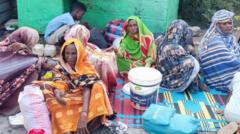In recent weeks, escalating conflict in Sudan's Gezira state has led to alarming reports of mass killings and other atrocities against civilians. Clementine Nkweta-Salami, a senior UN official and the Resident and Humanitarian Coordinator in Sudan, expressed her deep concern over the situation. She highlighted reports of "atrocious crimes," including mass killings attributed to the paramilitary Rapid Support Forces (RSF), which have been at the forefront of violence in the region.
According to an activist group, at least 124 civilians were killed in a series of attacks on villages conducted by the RSF over the past week. The RSF, however, has denied these allegations, insisting that their operations focus on battling militias aligned with the military, not on civilians. The complexity of the situation has been exacerbated by a power struggle between Gen Mohamed Hamdan Dagalo, the head of the RSF, and Gen Abdel Fattah al-Burhan of the Sudanese armed forces.
The conflict, which erupted in April 2023, has already claimed tens of thousands of lives and displaced more than 11 million people. In a notable escalation, Gezira state has now emerged as a significant battleground following the defection of Abu Aqla Kayka, an RSF commander who transitioned to the military's side, apparently bringing a substantial number of troops with him. This defection prompted retaliatory threats from the RSF, vowing to defend their forces and target those wielding arms.
Ms. Nkweta-Salami noted that preliminary reports indicate a coordinated RSF assault occurred between October 20 and 25, resulting not only in mass killings but also in incidents of sexual violence and widespread looting. The nature of these crimes mirrors those perpetrated in Sudan's Darfur region, where the RSF has previously been implicated in ethnic cleansing. Human rights groups, including the Wad Madani Resistance Committee and the Sudanese doctors' union, have called for urgent international intervention to facilitate humanitarian aid.
Despite ongoing attempts by various nations, including the US and Saudi Arabia, to mediate a peace agreement between the conflicting parties, both military leaders have refused to sign a comprehensive deal. As the violence persists and civilian suffering mounts, the UN and various advocacy groups continue to plead for protective measures and humanitarian access in the face of potentially escalating atrocities.
According to an activist group, at least 124 civilians were killed in a series of attacks on villages conducted by the RSF over the past week. The RSF, however, has denied these allegations, insisting that their operations focus on battling militias aligned with the military, not on civilians. The complexity of the situation has been exacerbated by a power struggle between Gen Mohamed Hamdan Dagalo, the head of the RSF, and Gen Abdel Fattah al-Burhan of the Sudanese armed forces.
The conflict, which erupted in April 2023, has already claimed tens of thousands of lives and displaced more than 11 million people. In a notable escalation, Gezira state has now emerged as a significant battleground following the defection of Abu Aqla Kayka, an RSF commander who transitioned to the military's side, apparently bringing a substantial number of troops with him. This defection prompted retaliatory threats from the RSF, vowing to defend their forces and target those wielding arms.
Ms. Nkweta-Salami noted that preliminary reports indicate a coordinated RSF assault occurred between October 20 and 25, resulting not only in mass killings but also in incidents of sexual violence and widespread looting. The nature of these crimes mirrors those perpetrated in Sudan's Darfur region, where the RSF has previously been implicated in ethnic cleansing. Human rights groups, including the Wad Madani Resistance Committee and the Sudanese doctors' union, have called for urgent international intervention to facilitate humanitarian aid.
Despite ongoing attempts by various nations, including the US and Saudi Arabia, to mediate a peace agreement between the conflicting parties, both military leaders have refused to sign a comprehensive deal. As the violence persists and civilian suffering mounts, the UN and various advocacy groups continue to plead for protective measures and humanitarian access in the face of potentially escalating atrocities.























